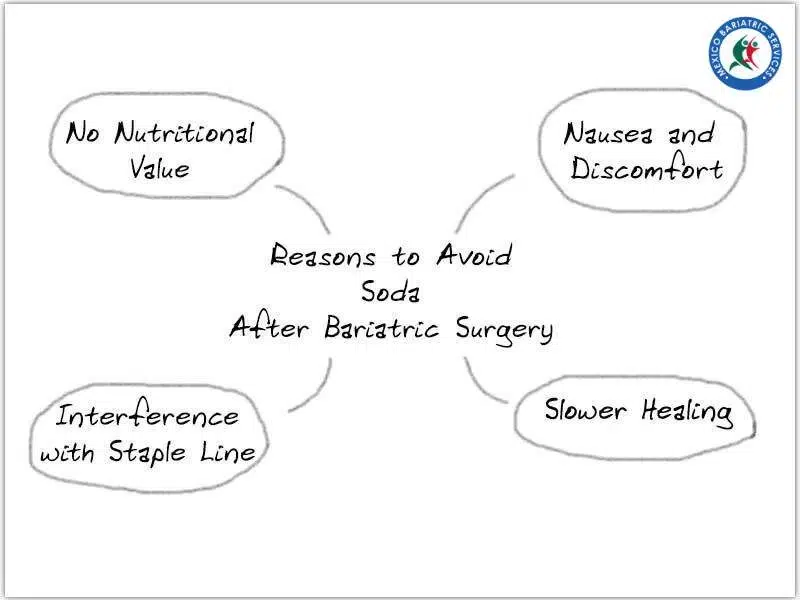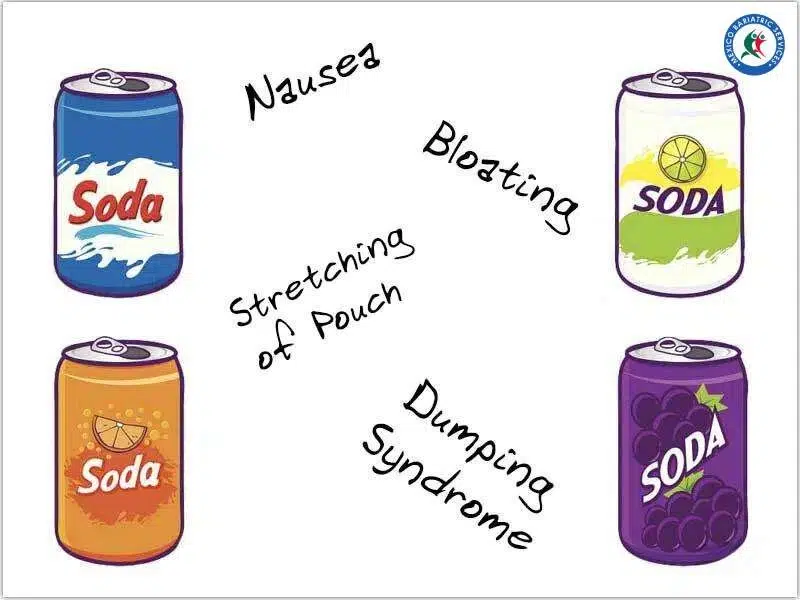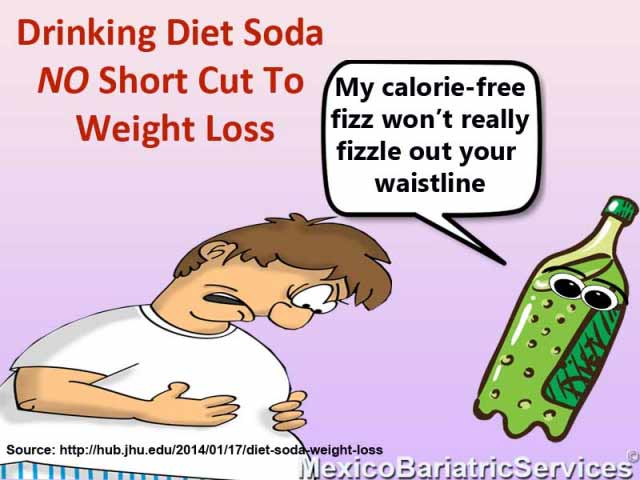This is Why You Should Avoid Soda After Bariatric Surgery
Medically Reviewed by Katelyn J. Mock, US-Registered Dietician (R.D.)
Can you drink soda after bariatric surgery? Whether it’s due to your previous lifestyle or newfound cravings, here’s why it’s better to avoid it.
A regular can of soda can have 8-13 teaspoons of sugar for every 12 ounces, so it’s easy to see how the numbers can easily add up. People who consume soda on the regular are at a higher risk for weight gain, cardiovascular issues, and even dental problems.
It comes as no surprise, that after bariatric surgery, regular or diet soda consumption is not recommended. One way to prevent weight gain after bariatric surgery is to abstain from consuming sweetened beverages.[2]Benson-Davies, Sue, Michael L. Davies, and Kendra Kattelmann. “Understanding Eating and Exercise Behaviors in Post-Roux-En-Y Gastric Bypass Patients: A Quantitative and Qualitative Study.” Bariatric Surgical Practice and Patient Care2 (2013): 61–68. PMC. Web. 19 July 2018.
View in Article
Soda After Weight Loss Surgery?
Reasons to Avoid Soda Post-Weight Loss Surgery

- Liquid sugar has zero nutritional value which is also known as “empty calories,” as it fills out your stomach pouch and takes up space for healthy nutrients. This can lead to overeating, bloating, nausea, and even dumping syndrome after gastric bypass surgery.
- Sugary and fizzy drinks aren’t recommended after gastric sleeve surgery due to their high CO2 content, which can also cause nausea and discomfort.[3]Graham Y. et al. “Patient Experiences of Adjusting to Life in the First 2 Years after Bariatric Surgery: A Qualitative Study”. Clinical Obesity 5 (2017): 323-335. PMS. Web. Accessed 11 July 2018.
View in Article - Initially, after a gastric sleeve, bypass, or any other bariatric surgery, drinking a carbonated beverage could interfere with your staple line and the healing process.
Impact of Soda After Bariatric Surgery

- Science isn’t conclusive on this, but artificial sweeteners may cause increased cravings for sweets and carbohydrates. Dr. David Ludwig, a specialist at Harvard-affiliated Boston Children’s Hospital, says that “artificial sweeteners may cause people to replace the lost calories with other foods.” The American Heart Association and American Diabetes Association agree with this statement.[4]Holly Strawbridge, “Artificial Sweeteners: Sugar-free, but at what cost?” Harvard Health Publishing (Harvard Medical School) 20 July 2018.
View in Article - It seems that Coca-Cola can potentially increase the risk of developing kidney stones. A 2013 study showed that there was a 23% increased risk of kidney stones in patients who consumed soda and other beverages.[5]Ferraro, Pietro Manuel et al. “Soda and Other Beverages and the Risk of Kidney Stones.” Clinical Journal of the American Society of Nephrology: CJASN 8.8 (2013): 1389–1395. PMC. Web. 19 July 2018.
View in Article - Caffeine is a diuretic and is often present in many regular and diet soda drinks. It can cause you to lose valuable fluids that are important for macro and micronutrient absorption.[6]Seal, Adam D. et al. “Coffee with High but Not Low Caffeine Content Augments Fluid and Electrolyte Excretion at Rest.” Frontiers in Nutrition 4 (2017): 40. PMC. Web. 20 July 2018.
View in Article - Sodium, which is frequently added to sodas, is known to increase your thirst and fluid needs.
- Phosphoric acid can cause decreased absorption of calcium (a much-needed nutrient after surgery).
Avoid using a straw and obviously no carbonated drinks. Sometimes when people still use straws they can develop air bubbles. This causes discomfort. – Katelyn JM (US Registered Dietician)
How to Resist Soda Cravings
Resisting soda cravings can be hard, especially if you’re used to drinking them daily. Here are some ideas that can help:
- Find good alternatives to soda, like flavored water, coconut water, and sugar-free lemonade.
- For your daily dose of caffeine, it is better to have a cup of tea or coffee without sugar.
- Count calories – knowing how much sugar and calories are in a can of soda can act as a great deterrent by itself. For example, in order to burn the calories in a 20-ounce soda can, you will need to run for about 50 minutes or walk for 5 miles. Is that soda really worth it?
- Always carry a bottle of water or any other healthy beverage alternative to sodas with you. This will decrease the urge to buy soda cans.
- Avoid places that serve sodas, like the office vending machines.
- Avoid consuming sugary or too-greasy food that can make you crave a soda.
Regular vs Diet Soda
According to a study done by researchers at Johns Hopkins University, adults who are overweight and drink diet soda are more likely to compensate for their calories by eating more. Hence, drinking diet soda does not really aid in weight loss.
Data compiled under the study shows that overweight individuals who switch to diet soda roughly consume the same number of calories as overweight adults who drink regular soda. Click here to read more about the research study.
Soda vs Sparkling Water
Unlike soda, sparkling water is naturally carbonated, contains zero calories, and comes with a variety of different minerals. It’s no wonder people often wonder if that means drinking it after bariatric surgery is still harmful.
It’s still generally considered best to avoid carbonated drinks after weight-loss surgeries, as bubbly drinks can cause an upset stomach, nausea, and gas, particularly while the stomach is still healing.
After the bariatric surgery, the new real estate in your stomach or pouch is PRIME (meaning there’s limited space in there)! You don’t want to fill it with junk, and that’s why it’s important to eat nutrient-rich food in appropriate quantities.
According to a study by researchers at Johns Hopkins University, adults who are overweight and drink diet soda are more likely to compensate for their calories by eating more. Hence, drinking diet soda does not really aid in weight loss.
Data compiled under the study shows that overweight individuals who switch to diet soda roughly consume the same number of calories as overweight adults who drink regular soda. Click here to read more about the research study.

Disclaimer: Weight loss results may vary. We do not guarantee any specific results.
The new real estate in your stomach or pouch is PRIME (meaning there’s limited space in there)! You don’t want to fill it with junk. It is important to eat nutrient-rich food in appropriate quantities.
References
- SFGate Healthy Eating, Kelsey Casselbury. “How Much Sugar is Really in a Soda?” Accessed 11 July 2018.
- Benson-Davies, Sue, Michael L. Davies, and Kendra Kattelmann. “Understanding Eating and Exercise Behaviors in Post Roux-En-Y Gastric Bypass Patients: A Quantitative and Qualitative Study.” Bariatric Surgical Practice and Patient Care2 (2013): 61–68. PMC. Web. 19 July 2018.
- Graham Y. et al. “Patient Experiences of Adjusting to Life in the First 2 Years after Bariatric Surgery: A Qualitative Study”. Clinical Obesity 5 (2017): 323-335. PMS. Web. Accessed 11 July 2018.
- Holly Strawbridge, “Artificial Sweeteners: Sugar-free, but at what cost?” Harvard Health Publishing (Harvard Medical School) 20 July 2018.
- Ferraro, Pietro Manuel et al. “Soda and Other Beverages and the Risk of Kidney Stones.” Clinical Journal of the American Society of Nephrology: CJASN 8.8 (2013): 1389–1395. PMC. Web. 19 July 2018.
- Seal, Adam D. et al. “Coffee with High but Not Low Caffeine Content Augments Fluid and Electrolyte Excretion at Rest.” Frontiers in Nutrition 4 (2017): 40. PMC. Web. 20 July 2018.

